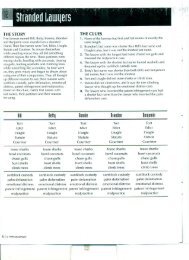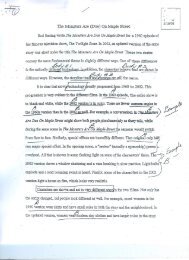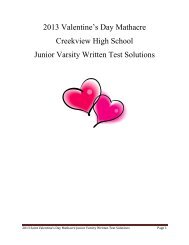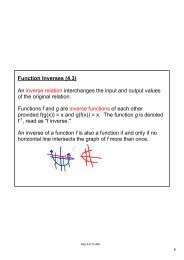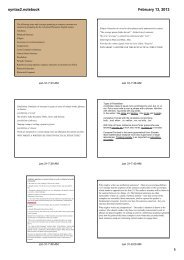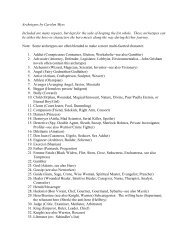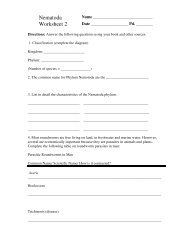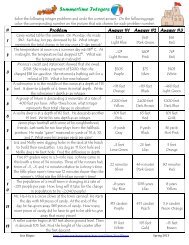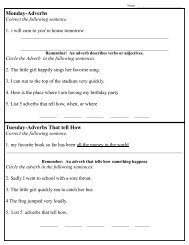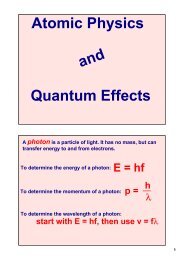Rosencrantz and Guildenstern Are Dead - Cherokee County Schools
Rosencrantz and Guildenstern Are Dead - Cherokee County Schools
Rosencrantz and Guildenstern Are Dead - Cherokee County Schools
You also want an ePaper? Increase the reach of your titles
YUMPU automatically turns print PDFs into web optimized ePapers that Google loves.
Act II when <strong>Rosencrantz</strong> responds to Hamlet's esoteric Shakespearean language by saying, "half of what he<br />
said meant something else, <strong>and</strong> the other half didn't mean anything at all." Generations of readers <strong>and</strong><br />
theatre-goers who have silently struggled at times to underst<strong>and</strong> the dem<strong>and</strong>ing dialogue of "the world's<br />
greatest playwright <strong>and</strong> the world's greatest play'' chuckle as the ordinary man speaks up.<br />
Parody<br />
Thus, we are led also to parody as a source of Stoppard's humor in <strong>Rosencrantz</strong> <strong>and</strong> <strong>Guildenstern</strong> <strong>Are</strong> <strong>Dead</strong>.<br />
Stoppard's references to other literary texts are numerous <strong>and</strong> subtle, but parody as a literary style frequently<br />
imitates a serious work in order to demean it. Stoppard's parody is distinctive because it is generally quite<br />
respectful <strong>and</strong> affectionate toward its source rather than critical.<br />
Apart from his parodic use of Shakespeare's Hamlet, Stoppard is most clearly parodying Samuel Beckett's<br />
Waiting for Godot, whose two main characters, Vladimir <strong>and</strong> Estragon, play word games <strong>and</strong> "pass the time"<br />
as they wait for someone who never arrives. Beckett's play begins on a country road that is distinctly<br />
non-descript, so when Stoppard specifies in his opening stage directions that "two Elizabethans [are] passing<br />
the time in a place without any visible character" it is sufficient to recall Waiting for Godot for those who are<br />
very familiar with the Beckett classic. However, if this reference is missed, Stoppard includes another<br />
reference later in the play that is even less mistakable. Near the end of Act II, when Hamlet is dragging<br />
Polonius's body across the stage, <strong>Rosencrantz</strong> <strong>and</strong> <strong>Guildenstern</strong> unfasten their belts <strong>and</strong> hold them taut to form<br />
a trap for Hamlet. This comes to naught as Hamlet avoids them, but the parodic comedy sparkles when<br />
<strong>Rosencrantz</strong>'s trousers fall down, recalling a similar scene at the end of Waiting for Godot. The parody is not<br />
intended to satirize Beckett's play or either pair of characters. If anything it ennobles both, paying respects to<br />
Beckett's genius, as in an "homage," <strong>and</strong> dignifying the silliness of <strong>Rosencrantz</strong> <strong>and</strong> <strong>Guildenstern</strong>. With his<br />
buddy's trousers comically gathered at his ankles <strong>and</strong> facing another complete failure, <strong>Guildenstern</strong> says quite<br />
simply, "there's a limit to what two people can do."<br />
Apart from the simple pleasure of recognition that such parody provides a knowing audience, this parody<br />
enlarges the suggestiveness of Stoppard's text. His two ordinary men are not to be taken as victims of an<br />
absurdist world, as Beckett's are. <strong>Rosencrantz</strong> <strong>and</strong> <strong>Guildenstern</strong> live in a simpler world where the inevitability<br />
of death is not tragic but a natural part of life. If human beings can calm their minds, they will realize that it is<br />
"silly to be depressed" by death, that "it would be just like being asleep in a box." When, at the beginning of<br />
the play, <strong>Rosencrantz</strong> exults that eighty-five consecutive winning calls of heads has "beaten the record,"<br />
<strong>Guildenstern</strong> says "don't be absurd," <strong>and</strong> the clever allusion to Beckett speaks volumes to those who catch the<br />
joke.<br />
Historical Context<br />
The Turbulent Sixties <strong>and</strong> Stoppard as a Political Playwright<br />
The year 1966, like rest of the mid-1960s, was extremely turbulent both socially <strong>and</strong> politically. U.S.<br />
involvement in the Vietnam War, for example, aroused world-wide protest as the Chairman of the U.S. Senate<br />
Foreign Relations Committee, J. W. Fulbright, challenged the legality of America's military involvement in<br />
Southeast Asia <strong>and</strong> even Pope Paul VI pled for an end to hostilities. In America, the National Organization for<br />
Women (NOW) was founded by Betty Friedan to gain equal rights for women, <strong>and</strong> the civil rights movement<br />
for American blacks was spurring race riots in Clevel<strong>and</strong>, Chicago, <strong>and</strong> Atlanta. The 1964 Civil Rights Act<br />
was being openly defied by Southern states refusing to desegregate schools <strong>and</strong> the University of Mississippi's<br />
first black graduate, James Meredith, was shot while participating in a Mississippi voting rights march.<br />
Meanwhile, Massachusetts voters elected Edward Brooke the first black U.S. senator since Reconstruction.<br />
Closer to home for Stoppard, Engl<strong>and</strong> was responding to dem<strong>and</strong>s for independence from Rhodesia <strong>and</strong><br />
conflicts heated up between Protestants <strong>and</strong> Catholics in Northern Irel<strong>and</strong>.<br />
Historical Context 7





